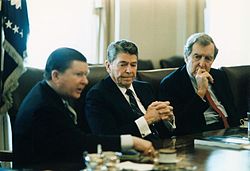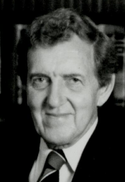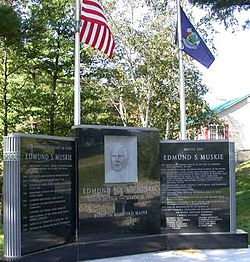- Edmund Muskie
-
Edmund Sixtus "Ed" Muskie 
58th United States Secretary of State In office
May 8, 1980 – January 20, 1981President Jimmy Carter Deputy Warren Christopher Preceded by Cyrus Vance Succeeded by Alexander Haig United States Senator
from MaineIn office
January 3, 1959 – May 7, 1980Preceded by Frederick Payne Succeeded by George J. Mitchell 64th Governor of Maine In office
January 5, 1955 – January 2, 1959Preceded by Burton M. Cross Succeeded by Robert Haskell Chairman of the United States Senate Committee on the Budget In office
January 3, 1975 – May 8, 1980Preceded by None Succeeded by Fritz Hollings Personal details Born March 28, 1914
Rumford, MaineDied March 26, 1996 (aged 81)
Washington, D.C.Political party Democratic Spouse(s) Jane Muskie Alma mater Bates College
Cornell UniversityProfession Lawyer Religion Roman Catholic Signature 
Military service Service/branch United States Navy Years of service 1942–1945 Rank Lieutenant Battles/wars World War II Edmund Sixtus "Ed" Muskie (March 28, 1914 – March 26, 1996) was an American politician from Rumford, Maine. He served as Governor of Maine from 1955 to 1959, as a member of the United States Senate from 1959 to 1980, and as Secretary of State under Jimmy Carter from 1980 to 1981. Muskie was the Democratic nominee for Vice President in the 1968 presidential election, and was a candidate for the Democratic nomination for President in 1972.
Muskie held the highest office (Secretary of State) held by a Polish American in U.S. history, and also is the only Polish American ever nominated by a major party for Vice President.
Contents
Early life
Muskie was born in Rumford, Maine. His father, Stephen Marciszewski (mar-chih-SHEF-ski) immigrated to the United States in 1903 and changed his name to Muskie. His mother Josephine (née Czarnecki) was born in Buffalo, New York to Polish immigrants. His parents, Roman Catholics, had seven children, of whom six survived.
Muskie attended Bates College in Lewiston, Maine, where he majored in history and government. While at Bates, Muskie was a successful member of the debating team, participated in several sports, and was elected to student government. He also worked during the school year as a waiter, and during the summers at a hotel in Kennebunk, Maine, to supplement the scholarship that allowed him to attend the college. He graduated from Bates in 1936, and from Cornell Law School in 1939.
During World War II, Muskie served in the United States Navy, rising to the rank of lieutenant. After the war, he opened a private law practice in Waterville, Maine, and married Jane Gray.
Career in Maine
After the war, he was instrumental in building up the Democratic Party in Maine. Maine had traditionally been a strongly Republican state, notable for being, with Vermont, one of the only two states that Alf Landon carried against Franklin D. Roosevelt in 1936.
Muskie ran in the 1947 election to become mayor of Waterville, Maine, but was unsuccessful.[1] He served in the Maine House of Representatives before being elected governor in 1954.
National career
In the Senate election in 1958, Muskie won 60 percent of the vote, defeating incumbent Republican Senator Frederick G. Payne, who received 39 percent of the vote. Muskie was reelected in 1964, 1970 and 1976, each time with over 60 percent of the vote. Muskie was one of the first environmentalists to enter the Senate, and was a leading campaigner for new and stronger measures to curb pollution and provide a cleaner environment.
In 1968, Muskie was nominated for Vice President on the Democratic ticket with sitting Vice President Hubert Humphrey. The Humphrey-Muskie campaign lost the election to Richard Nixon and Spiro Agnew. Humphrey and Muskie 42.72 percent of the popular vote and carried 13 states and 191 electoral votes; Nixon and Agnew won 43.42 of the popular vote and carried 32 states and 301 electoral votes, while the third party ticket of George Wallace and Curtis LeMay, running as candidates of the American Independent Party, taken 13.53 of the popular vote and took five states in the Deep South and their 46 votes in the electoral college. Because of Agnew's apparent weakness as a candidate relative to Muskie, Humphrey was heard to remark that voters' uncertainties about whom to choose between the two major presidential candidates should be resolved by their attitudes toward the Vice-Presidential candidates.[2]
Continuing his career in the Senate, Muskie served as chairman of the Senate Budget Committee through the Ninety-third to the Ninety-sixth Congresses in 1973–80.
In 1970, the Maine senator was chosen to articulate the Democratic party's message to congressional voters before the midterm elections. Muskie's national stature was raised as a major candidate for the Democratic presidential nomination in 1972. In 1973, he gave the Democratic response to Nixon's State of the Union address.[3]
Presidential candidate
 Muskie (right) listens as John Tower (left) delivers the "Tower Report" to President Ronald Reagan, 1987.
Muskie (right) listens as John Tower (left) delivers the "Tower Report" to President Ronald Reagan, 1987. Main article: United States presidential election, 1972
Main article: United States presidential election, 1972Before the 1972 election, Muskie was viewed as a front-runner for the Democratic presidential nomination. In August 1971 Harris polling amid a growing economic crisis, Muskie came out on top of incumbent Nixon if the election had been held that day.[4] The nation was at war in Vietnam and President Richard Nixon's war policies (and foreign policy, more generally) promised to be a major issue in the campaign.[2]
The 1972 Iowa caucuses, however, significantly altered the race for the presidential nomination. Senator George McGovern from South Dakota, initially a dark horse candidate, made a strong showing in the caucuses which gave his campaign national attention. Although Muskie won the Iowa caucuses, McGovern's campaign left Iowa with momentum. Muskie himself had never participated in a primary election campaign, and it is possible that this led to the downfall of his campaign. Although Muskie went on to win the New Hampshire primary, the victory was only by a small margin, and his campaign faltered.[2]
The collapse of Muskie's momentum early in the 1972 campaign is also attributed to his response to campaign attacks. Prior to the New Hampshire primary, the so-called "Canuck letter" was published in the Manchester Union-Leader. The letter claimed that Muskie had made disparaging remarks about French-Canadians – a remark likely to injure Muskie's support among the French-American population in northern New England. Subsequently, the paper published an attack on the character of Muskie's wife Jane, reporting that she drank and used off-color language during the campaign. Muskie made an emotional defense of his wife in a speech outside the newspaper's offices during a snowstorm. Though Muskie later stated that what had appeared to the press as tears were actually melted snowflakes, the press reported that Muskie broke down and cried, shattering the candidate's image as calm and reasoned.[5]
Evidence later came to light during the Watergate scandal investigation that, during the 1972 presidential campaign, the Nixon campaign committee maintained a "dirty tricks" unit focused on discrediting Nixon's strongest challengers. Federal Bureau of Investigation (FBI) investigators revealed that the Canuck Letter was a forged document as part of the dirty-tricks campaign against Democrats orchestrated by the Nixon campaign.[6]
In a 1972 article for Rolling Stone, Hunter S. Thompson wrote that it was well known amongst journalists covering Muskie's campaign that Muskie had become addicted to Ibogaine, an obscure Brazilian painkiller. The rumor reappeared during the campaign on newswires. In a 1977 TV interview for CBC News, Thompson stated that he invented the story and was surprised when he realized that people were taking it seriously.
Secretary of State
Muskie returned to serve in the Senate, where he served as the first chairman of the new Senate Budget Committee starting in 1974. In 1980, he was tapped by President Jimmy Carter to serve as Secretary of State, following the resignation of Cyrus Vance. Vance had opposed Operation Eagle Claw, a secret rescue mission intended to rescue American hostages held by Iran. After that mission failed with the loss of eight U.S. servicemen, Vance resigned.
There was a short-lived "draft Muskie" movement in the summer of 1980 that was seen as a favorable alternative to a deadlocked convention. One poll showed that Muskie would be a more popular alternative to Carter than Kennedy, implying that the attraction was not so much to Kennedy as to the fact that he was not Carter. Muskie was polling even with Ronald Reagan at the time, while Carter was seven points down.[7] The underground draft campaign failed, but became a political legend.[8]
Muskie attempted to bring the hostages home by diplomatic means, appealing to the United Nations and Iran. Muskie left public office following Carter's loss of the 1980 presidential election to Ronald Reagan, and was awarded the Presidential Medal of Freedom by Carter on January 16, 1981.
Retirement and death
Muskie retired to his home in Washington, D.C. in 1981. He continued to work as a lawyer for some years. In 1987, as an elder statesman, Muskie was appointed a member of the President's Special Review Board known as the "Tower Commission" to investigate President Ronald Reagan's administration's role in the Iran-Contra scandal.
Muskie died in Washington, D.C. of congestive heart failure in 1996, two days shy of his 82nd birthday. He is buried in Arlington National Cemetery. Muskie's papers[9] are kept at the Edmund S. Muskie Archives and Special Collections Library[10] at Bates College in Lewiston, Maine.
Electoral history
Main article: Electoral history of Edmund MuskieSee also
- List of U.S. political appointments that crossed party lines
- Edmund S. Muskie Graduate Fellowship Program, a fellowship which bears his name.
References
- ^ "Edmund S. Muskie Oral History Collection", Edmund S. Muskie Archives and Special Collections Library, Bates College, May 25, 2006.
- ^ a b c Nixon, Richard. RN: The Memoirs of Richard Nixon.
- ^ Frum, David (2000). How We Got Here: The '70s. New York, New York: Basic Books. p. 47. ISBN 0-465-04195-7.
- ^ Frum, David (2000). How We Got Here: The '70s. New York, New York: Basic Books. p. 298. ISBN 0-465-04195-7.
- ^ "Remembering Ed Muskie", Online NewsHour, PBS, March 26, 1996.
- ^ Theodore White, The Making of the President, 1972.
- ^ "Clinton Campaign Reminiscent of 1980 Race", The CBS News.
- ^ "Steenland: Odd man out?", The Star Tribune.
- ^ http://abacus.bates.edu/muskie-archives/EADFindingAids/MC105.html
- ^ http://abacus.bates.edu/Library/aboutladd/departments/special/
External links
- Biography at the Biographical Directory of the United States Congress
- Voting record maintained by The Washington Post
- The Edmund S. Muskie Foundation
- Edmund Muskie at Findagrave
Political offices Preceded by
Burton M. CrossGovernor of Maine
1955–1959Succeeded by
Robert N. HaskellNew title
Committee created following
Congressional Budget and Impoundment Control Act of 1974Chairman of the Senate Budget Committee
1975 – 1980Succeeded by
Fritz HollingsPreceded by
Cyrus VanceUnited States Secretary of State
Served under: Jimmy Carter
May 8, 1980 – January 18, 1981Succeeded by
Alexander M. HaigUnited States Senate Preceded by
Frederick PayneUnited States Senator (Class 1) from Maine
1959–1980
Served alongside: Margaret Chase Smith, William Hathaway, William CohenSucceeded by
George MitchellParty political offices Preceded by
Hubert HumphreyDemocratic Party Vice Presidential nominee
1968Succeeded by
Thomas Eagleton,
Sargent Shriver (1)Notes and references 1. Thomas Eagleton was the original Vice Presidential nominee in 1972. He withdrew from the race and was replaced by Sargent Shriver. Governors of Maine  W. King · Williamson · Ames · Parris · Lincoln · Cutler · Hall · Hunton · Smith · Dunlap · Kent · Fairfield · Kent · Fairfield · Kavanagh · Dunn · Anderson · Dana · Hubbard · Crosby · A. Morrill · Wells · Hamlin · Williams · L. Morrill · Washburn · Coburn · Cony · Chamberlain · Perham · Dingley · Connor · Garcelon · Davis · Plaisted · Robie · Bodwell · Marble · Burleigh · Cleaves · Powers · Hill · Cobb · Fernald · F. Plaisted · Haines · O. Curtis · Milliken · Parkhurst · Baxter · Brewster · Gardiner · Brann · Barrows · Sewall · Hildreth · Payne · N. Haskell · Cross · Muskie · R. Haskell · Clauson · Reed · K. Curtis · Longley · Brennan · McKernan · A. King · Baldacci · LePage
W. King · Williamson · Ames · Parris · Lincoln · Cutler · Hall · Hunton · Smith · Dunlap · Kent · Fairfield · Kent · Fairfield · Kavanagh · Dunn · Anderson · Dana · Hubbard · Crosby · A. Morrill · Wells · Hamlin · Williams · L. Morrill · Washburn · Coburn · Cony · Chamberlain · Perham · Dingley · Connor · Garcelon · Davis · Plaisted · Robie · Bodwell · Marble · Burleigh · Cleaves · Powers · Hill · Cobb · Fernald · F. Plaisted · Haines · O. Curtis · Milliken · Parkhurst · Baxter · Brewster · Gardiner · Brann · Barrows · Sewall · Hildreth · Payne · N. Haskell · Cross · Muskie · R. Haskell · Clauson · Reed · K. Curtis · Longley · Brennan · McKernan · A. King · Baldacci · LePageUnited States Senators from Maine Class 1 
Class 2 United States Secretary of State Secretary of Foreign Affairs
1781–1789R. Livingston • JaySecretary of State
1789–presentJefferson • Randolph • Pickering • J. Marshall • Madison • Smith • Monroe • Adams • Clay • Van Buren • E. Livingston • McLane • Forsyth • Webster • Upshur • Calhoun • Buchanan • Clayton • Webster • Everett • Marcy • Cass • Black • Seward • Washburne • Fish • Evarts • Blaine • Frelinghuysen • Bayard • Blaine • Foster • Gresham • Olney • Sherman • Day • Hay • Root • Bacon • Knox • Bryan • Lansing • Colby • Hughes • Kellogg • Stimson • Hull • Stettinius • Byrnes • G Marshall • Acheson • Dulles • Herter • Rusk • Rogers • Kissinger • Vance • Muskie • Haig • Shultz • Baker • Eagleburger • Christopher • Albright • Powell • Rice • ClintonUnited States presidential election, 1968 Republican Party
Convention · PrimariesNominee: Richard Nixon (campaign)
VP Nominee: Spiro Agnew
Candidiates: Frank Carlson · Clifford Case · Hiram L. Fong · John Lindsay · Ronald Reagan · Jim Rhodes · Nelson Rockefeller · Winthrop Rockefeller · George W. Romney · (campaign) · Harold Stassen · John A. VolpeDemocratic Party
Convention · PrimariesNominee: Hubert Humphrey (campaign)
VP Nominee: Edmund Muskie
Candidates: Roger D. Branigin · John G. Crommelin · Paul C. Fisher · Lyndon B. Johnson · Robert F. Kennedy (campaign) · Thomas C. Lynch · Eugene McCarthy (campaign) · George McGovern · Dan K. Moore · Channing E. Phillips · George Smathers · Stephen M. YoungAmerican Independent Party Other Third party and independent candidates Communist Party USA Nominee: Charlene Mitchell
VP Nominee: Michael ZagarellPeace and Freedom Party Prohibition Party Nominee: E. Harold MunnSocialist Labor Party Nominee: Henning A. BlomenSocialist Workers Party Independents and other candidates: Other 1968 elections: House · SenateUnited States presidential election, 1972 Republican Party
Convention · PrimariesDemocratic Party
Convention · PrimariesNominee: George McGovern
VP Nominee: Sargent Shriver
Candidates: Shirley Chisholm · Walter Fauntroy · Fred R. Harris · Vance Hartke · Wayne Hays · Hubert Humphrey · Henry M. Jackson · John Lindsay · Eugene McCarthy · Wilbur Mills · Patsy Mink · Edmund Muskie · Terry Sanford · George Wallace · Sam YortyThird party and independent candidates American Independent Party Communist Party USA Libertarian Party Nominee: John Hospers
VP Nominee: Tonie NathanPeople's Party Prohibition Party Nominee: E. Harold MunnSocialist Labor Party Nominee: Louis FisherSocialist Workers Party Independent Other 1972 elections: House · SenateCabinet of President Jimmy Carter (1977–1981) Cabinet Secretary of State Cyrus Vance (1977–1980) • Edmund Muskie (1980–1981)
Secretary of the Treasury W. Michael Blumenthal (1977–1979) • G. William Miller (1979–1981)Secretary of Defense Harold Brown (1977–1981)Attorney General Griffin Bell (1977–1979) • Benjamin Civiletti (1979–1981)Secretary of the Interior Cecil D. Andrus (1977–1981)Secretary of Agriculture Robert Bergland (1977–1981)Secretary of Commerce Juanita M. Kreps (1977–1980) • Philip Klutznick (1980–1981)Secretary of Labor Ray Marshall (1977–1981)Secretary of Health, Education and Welfare Joseph A. Califano, Jr. (1977–1979) • Patricia Roberts Harris (1979–1979)Secretary of Health and Human Services Patricia Roberts Harris (1979–1981)Secretary of Education Shirley M. Hufstedler (1979–1981)Secretary of Housing and Urban Development Patricia Roberts Harris (1977–1979) • Maurice "Moon" Landrieu (1979–1981)Secretary of Transportation Brock Adams (1977–1979) • Neil Goldschmidt (1979–1981)Secretary of Energy James R. Schlesinger (1977–1979) • Charles Duncan, Jr. (1979–1981)Cabinet-level Vice President Walter Mondale (1977–1981)Ambassador to the United Nations Andrew Young (1977 – 1979) • Donald McHenry (1979 – 1981)Director of the Office of
Management and BudgetThomas "Bert" Lance (1977) • James T. McIntyre (1978 – 1981)Chair of the Council of Economic Advisers Charles Schultze (1977 – 1981)Advisor to the
President on National Security AffairsZbigniew Brzezinski (1977 – 1981)Categories:- United States Secretaries of State
- American environmentalists
- American lawyers
- American military personnel of World War II
- American people of Polish descent
- Bates College alumni
- Burials at Arlington National Cemetery
- Cardiovascular disease deaths in Washington, D.C.
- Cornell Law School alumni
- Deaths from congestive heart failure
- Democratic Party (United States) vice presidential nominees
- Governors of Maine
- Maine lawyers
- Members of the Maine House of Representatives
- People from Oxford County, Maine
- Presidential Medal of Freedom recipients
- United States Navy officers
- United States presidential candidates, 1972
- United States presidential candidates, 1980
- United States Senators from Maine
- United States vice-presidential candidates, 1968
- 1914 births
- 1996 deaths
- American Roman Catholics
- Democratic Party United States Senators
- Maine Democrats
Wikimedia Foundation. 2010.



